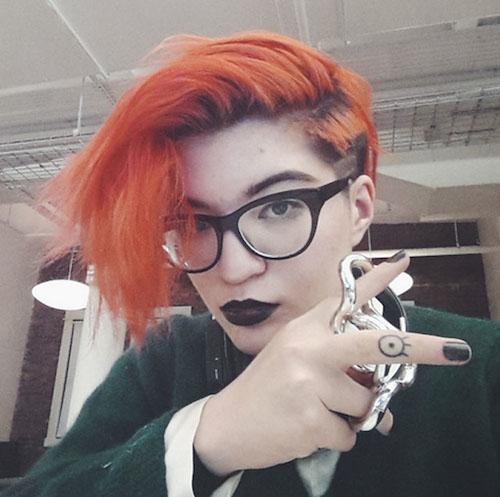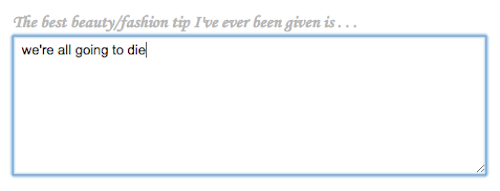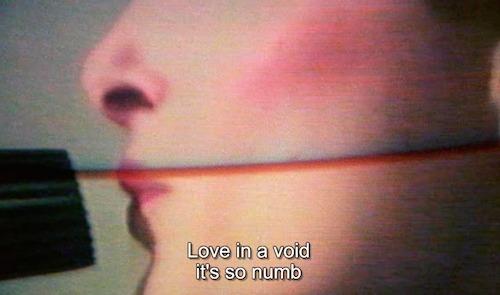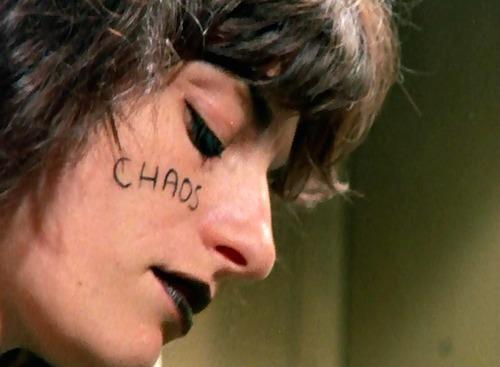Poetry is Not the Final Girl: Arabelle Sicardi
BY Trisha Low


I first met Arabelle Sicardi through Cassandra Gillig, who was her roommate at the time in New Jersey, although tbh I think we already stalked each others' tumblrs. Cass told me these stories about how Arabelle had this insane wardrobe and about how they were fond of drinking late night champagne while they sometimes rolled around in fur on the floor naked listening to Fall Out Boy at 2am on a Friday night, when all the while Cass would be sitting contentedly in her next door bed eating an avocado reading Bernadette Mayer wearing her ratty Chicago Bulls shirt with her headphones in.
Basically what I'm saying is that Arabelle is a close soul mate. Not just because we both like an everyday aesthetic that's kinda like "dead schoolgirl" meets "exploitation film" meets "dust mite at x1000 magnification," but because Arabelle understands first and foremost that horror isn't just a genre, it's a practice of belief, sometime of survival, and definitely a lifestyle of no mercy—for others and for selves.
Arabelle Sicardi is the beauty editor at Buzzfeed, cyborg extraordinaire, Bhanu Kapil fan and staunch refuser of authenticity. You can find their work at @thehairpin @jezebel @refinery29 @fashionista @everywhereelse or at their website.
~*~
TL: Let’s start with the most obvious, but also most telling question in honor of my favorite horror franchise, SCREAM: What’s your favorite scary movie?
AS: Repo! The Genetic Opera and The Orphanage. For different reasons though.
TL: But also, why? I like to think about you as not necessarily as a poet, but as a mortician at the nexis of aesthetic/life/theory. To clarify: not implementing theory in ~*real life*~ but actually using your personal intimacies as a primary mode of exploring theoretical concepts. How do you feel about that?
AS: I like that you think about me and in such a way. :’) That is a lovely way to put it, you could also just consider me a scavenger. I like to pluck the good meaty parts out of anything and string it together into something that helps me see things clearer. Morticians, I think, do things for other people, for the dead but mostly for the ones the dead leave behind. I like to weave things together to help me survive and I guess the people who read and enjoy my work. But mostly me.
But your question, why these movies! I love Repo so much because of the glamorous gore. It has Paris Hilton in it??? And surgical, emo broadway numbers? Jesus, isn’t that great? Guts and glamor. Like if the Osbournes were Tim Burton characters who had to put on Rocky Horror Picture Show. But The Orphanage is my biggest fear. That you can love someone so much but not hear them at all. Love is a horror movie.
TL: Love is a horror movie will probably always be my favorite read on horror movies. In the movies it's just that you can see the monsters more clearly. It’s interesting though right, because essentially this means that horror movies are a cinematic intensification or materialization of invisible social violences or restrictions. I’m thinking about like the "revenge of the dead girl" genre a la The Ring, or even the moralizing high school franchises a la Friday the 13th where the slut has to die first and the Final Girl has to be a virgin. Do you feel like there’s a revenge aspect to the way you integrate horror elements into an aesthetic or a cyborg life-philosophy?
AS: Oh yes. I am totally obsessed with the final girl, but I’m uninterested in torture porn as a horror genre so I don’t really revisit the classics like Texas Chainsaw because of it. My dad and I watch endless gore films together though—like the one-starred Japanese schoolgirl serial killer stuff on Netflix. We could watch that stuff for days on end. Machine Girl? Amazing. Now, when Park Chan Wook does it, with his vengeance trilogy, I find that so liberating and great. Lady Vengeance was my first real muse and hero besides Salome, who I have loved ever since I could read. For years when I was super focused on the concept of Lady Vengeance, like the betrayed mother character anti-hero angel….creature, I took on that role totally in my head, because I had never identified with a female character so closely before. Like, as an angry and cute asian girl in America, who the hell do you have riding for you in media? Lady Vengeance was my goth mom out for blood for the men who have followed women and children home. She was beautiful but used that against people. “What’s with the red eyeshadow?” “I don’t want to look kind-hearted.” Slay me, I mean really. I found it very inspiring, how she weaponized beauty in a way that was so potent. Because being beautiful didn’t protect her, but it did help her get revenge... I felt so understood. It is a really potent area of identity to explore: beauty turned against those who hold it above personhood. Beauty as an agent of terror and vigilantism, against and through patriarchy. Outside of it too, even, in her dreams. It’s a fantasy horror. If murder can make you feel good, somehow that movie makes it so.
That version of beauty/terror/revenge I explored though, was before I got fucked up. My cyborg philosophy deals less with revenge and more with getting more—getting past survival and into something else. I fell into Haraway after assault because dysphoria about having a body was way too raw that really harnessing beauty and girlhood felt self destructive to me: I didn’t want it, it didn’t protect me, nothing had, so it was time to start over. Cyborgs do not dream of returning to dust, you know? I don’t agree with all of Haraway’s manifesto and am way more in the afrofuturist side of things but also not really that since that isn’t a space I have a right to occupy. Like, of course I want revenge, but I actually just want more. I want to totally fucking obliterate everyone who has ever hurt me, but more than that I want to be upgraded! I want to be better in ways I hadn’t conceptualized before.
TL: What I really love seeing is people’s points of identifications in horror movies. For a lot of dude horror nerds, it’s really in the being-scared, the narrative discontinuity as pure aesthetic experience, but for a lot of people of colour or queer folk, the point of identification is the being-scary, locating oneself at a point at which ideal forms of beauty can be pushed to a limit of the uncanny, or the uncomfortable, which I do see in your work. Like, agreed, Machine Girl was one of the first movies I watched where I thought, wow, I finally get a role model. But the cute Asian girl in horror movies has a long history in the exploitation genre too. Just look at Tarentino’s Go-Go Yubari, or the hyperexotification of Anna May Wong.
I guess what’s so compelling to me about horror is that every typology is subject to inversion, contradiction, inappropriate embellishment, intentional (and internal) deception. Like what you say—to be upgraded! To embrace being-scary in horror is also to force people to envision what we might become—in the extreme negative. And in the process, we can form a kinship of distortion. So here’s a question—do you feel as though horror is purely the provenance of the Othered? Like can we make a claim for horror-separatism or do you think that might be problematic? I’m thinking of some revenge of the nerd shit where cis men claim horror or sci fi as once again an excuse for white nerd racism or misogyny, you know?
AS: What a good question. Hmmmmmm. I think that horror was made for the Othered, or rather, a space for us to occupy by force. Refugee camp for narrative, black mirror for the subjectively pure’s fears. That being said, horror was created by a woman!!! Right? Shelley. (Wikipedia receipts that say otherwise are inaccurate. If I’m wrong, okay, but I still think women write horror much better than men can, straight up.) When we speak about horror separatism or what have you…. no I don’t think it’s problematic, or maybe even if it is it’s fine? Things can be complicated. Disidentification is totally necessary when it comes to consuming media, how else can we come out on top? We have to build worlds to survive in. Horror is a space we can / should / do constantly reclaim! Like the avant garde. It is a beautiful dark twisted fantasy™ and fantasy is the realm of the marginalized, absolutely. I mean so many cult favorite sci-fi films are really just capitalist metaphors of marginalized people (read: specifically, black experience) but put on robots, or some other future-white!body. And so much of sci-fi is horror, just in space. We’re terrified of the future and monsters, who was it that said the future is necessarily monstrous? Yeah, Foucault. And Munoz said roughly that the future is a queer failure, but one we shouldn’t stop dreaming about it. Failure worth knowing! That’s how I feel about everything I love.
As for revenge of the nerd white people rewriting horror... like, when have they ever not been in charge of it though? They don’t need to reclaim it from queers when the dominant narratives of every horror movie is repression and save! the! blonde! virgin! The texture of blockbuster horror is really predictable but then so is most of Hollywood. We have some interesting newer horror movies right now: Babadook, A Girl Walks Home at Night, and I suppose It Follows, though I haven’t seen that yet. Hazel wrote about it and made me want to see it so badly though. It’s retro sex horror the way Carrie is, which is fun. Carrie is totally feminist terror.
TL: I love the idea of queer survivalism also being a failure worth knowing. It’s very Jose Munoz—a kind of utopic nihilism that can hold everything. I actually think the differences between mainstream horror and retro sex horror, even B-movie horror are all pretty drastic, but I love that they can all exist on the same plane. In that way, I do think horror is the ultimate queer genre right, like you never know which mutation it’s going to take or where it’s going to land, even when the scripts are all already laid out for you.
I guess my last question for you would be—any wise words for someone venturing into exploring a horror aesthetic in any medium? What’s your current paragon of horrific beauty?
AS: I don’t know if I have one right now, and that’s new, and good for me. Something I try to stick to but perpetually fail at is to have no real faultless heroes, no paragons and no pedestals. But really: every woman has a myth worth knowing. Give me chaos (give me new faces / new faces / I have seen the old ones). It’s more fun.
TL: I’ll end with a diptych from Derek Jarman’s Jubilee, because although not exactly horrific, it’s topical—"this is the generation who grew up and forgot to lead their lives; they were so busy watching my endless movie." Love in a void. Chaos rules. Thanks for being everything, Arabelle.
xoxo,
trisha.


Poet Trisha Low is the author of The Compleat Purge (2013), and her work was featured in the anthology...
Read Full Biography

